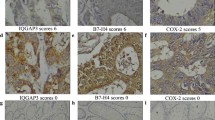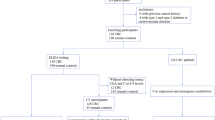Abstract
Background
Recent studies have demonstrated that Kisspeptin, the product of the metastasis suppressor gene KiSS-1, could have a role in tumor progression and invasion. In this pilot study, we investigated the association of plasma Kisspeptin-54 level with colorectal cancer (CRC).
Methods
Plasma Kisspeptin-54 levels were quantified using enzyme-immunoassay (EIA) kits from blood samples of 81 patients with CRC at their initial staging and 59 age-matched healthy controls.
Results
Plasma Kisspeptin-54 levels were significantly higher in CRC patients (86.2 ± 20.5) than in controls (49 ± 12.7; p < 0.005). The cutoff value for Kisspeptin-54 detection was determined as 46 ng/ml, and area under curve (AUC) value was 0.766 with sensitivity 63 %, specificity 81.4 %, positive predictive value 82.2 %, negative predictive value 61.5 %, positive likelihood ratio 3.38, and negative likelihood ratio 0.46. Increased plasma Kisspeptin-54 levels were significantly correlated with nodal involvement of CRC (Spearman, rs = 0.345, p = 0.002). Kisspeptin-54 was also found to be an independent predictive marker for lymph node metastases of CRC (p = 0; Exp(B): 2.053; 95 % CI, 1.255-2.851).
Conclusions
Our results reveal that plasma Kisspeptin-54 measurement could be a useful diagnostic and prognostic parameter for CRC. Further prospective evaluation is needed to validate these findings and to establish the clinical usefulness of Kisspeptin-54 for CRC diagnostics.




Similar content being viewed by others
References
Kotani M, Detheux M, Vandenbogaerde A et al (2001) The metastasis suppressor gene KiSS-1 encodes Kisspeptins, the natural ligands of the orphan G protein-coupled receptor GPR54. J Biol Chem 276:34631–34636
Muir AI, Chamberlain L, Elshourbagy NA et al (2001) AXOR12, a novel human G protein-coupled receptor, activated by the peptide KiSS-1. J Biol Chem 276:28969–28975
Ohtaki T, Shintani Y, Honda S et al (2001) Metastasis suppressor gene KiSS-1 encodes peptide ligand of a G-protein-coupled receptor. Nature 411:613–617
Lee JH, Miele ME, Hicks DJ et al (1996) KiSS-1, a novel human malignant melanoma metastasis-suppressor gene. J Natl Cancer Inst 88:1731–1737
Lee JH, Welch DR (1997) Suppression of metastasis in human breast carcinoma MDA-MB-435 cells after transfection with the metastasis suppressor gene, KiSS-1. Cancer Res 57:2384–2387
Ikeguchi M, Yamaguchi K, Kaibara N (2004) Clinical significance of the loss of KiSS-1 and orphan G-protein-coupled receptor (hOT7T175) gene expression in esophageal squamous cell carcinoma. Clin Cancer Res 10:1379–1383
Dhar DK, Naora H, Kubota H et al (2004) Downregulation of KiSS-1 expression is responsible for tumor invasion and worse prognosis in gastric carcinoma. Int J Cancer 111:868–872
Guan-Zhen Y, Ying C, Can-Rong N et al (2007) Reduced protein expression of metastasis-related genes (nm23, KISS1, KAI1 and p53) in lymph node and liver metastases of gastric cancer. Int J Exp Pathol 88:175–183
Yao HL, Yang ZL, Li YG et al (2007) In situ hybridization study on the expression of Kiss-1 and KAI-1 metastasis suppressor genes in gastric cancer. Zhonghua Wei Chang Wai Ke Za Zhi 10:274–277
Liang S, Yang ZL (2007) Expression of KiSS-1mRNA in pancreatic ductal adenocarcinoma and non-cancerous pancreatic tissues in SD rats. Zhong Nan Da Xue Xue Bao Yi Xue Ban 32:109–113
Nagai K, Doi R, Katagiri F et al (2009) Prognostic value of metastin expression in human pancreatic cancer. J Exp Clin Cancer Res 28:9
Ikeguchi M, Hirooka Y, Kaibara N (2003) Quantitative reverse transcriptase polymerase chain reaction analysis for KiSS-1 and orphan G-protein-coupled receptor (hOT7T175) gene expression in hepatocellular carcinoma. J Cancer Res Clin Oncol 129:531–535
Schmid K, Wang X, Haitel A et al (2007) KiSS-1 overexpression as an independent prognostic marker in hepatocellular carcinoma: an immunohistochemical study. Virchows Arch 450:143–149
Katagiri F, Nagai K, Kida A et al (2009) Clinical significance of plasma metastin level in pancreatic cancer patients. Oncol Rep 21:815–819
Dhillo WS, Savage P, Murphy KG et al (2006) Plasma kisspeptin is raised in patients with gestational trophoblastic neoplasia and falls during treatment. Am J Physiol Endocrinol Metab 291:E878–E884
Liang QL, Chen XD, Wang SM et al (2007) Expression of vascular endothelial growth factor and metastin in colorectal carcinoma. Nan Fang Yi Ke Da Xue Xue Bao 27:1584–1587
Chen X, Mo Y, Li L et al (2010) Increased plasma metastin levels in adolescent women with polycystic ovary syndrome. Eur J Obstet Gynecol Reprod Biol 149:72–76
DeLong ER, DeLong DM, Clarke-Pearson DL (1988) Comparing the areas under two or more correlated receiver operating characteristic curves: a nonparametric approach. Biometrics 44(3):837–845
Martin TA, Watkins G, Jiang WG (2005) KiSS-1 expression in human breast cancer. Clin Exp Metastasis 22(6):503–511
Marot D, Bieche I, Aumas C et al (2007) High tumoral levels of Kiss1 and G-protein-coupled receptor 54 expression are correlated with poor prognosis of estrogen receptor-positive breast tumors. Endocr Relat Cancer 14(3):691–702
Acknowledgments
This work was funded by Istanbul University, Grant No: 5825. EC was attending surgeon from Ministry of Health Hospital, Turkey, and principal scientist who dealt with the project at Istanbul University during this study. The authors are grateful to Professor Ian Zachary (UCL, Cardiovascular Surgery, London) for his critical reading of the manuscript.
Author information
Authors and Affiliations
Corresponding author
Rights and permissions
About this article
Cite this article
Canbay, E., Ergen, A., Bugra, D. et al. Kisspeptin-54 Levels are increased in Patients with Colorectal Cancer. World J Surg 36, 2218–2224 (2012). https://doi.org/10.1007/s00268-012-1636-7
Published:
Issue Date:
DOI: https://doi.org/10.1007/s00268-012-1636-7




